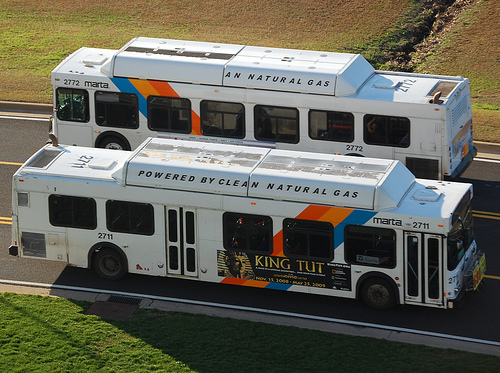Voters react to transportation initiatives
The massive Republican gains of the 2014 midterm elections don’t give fans of alternative modes of transit much cause to celebrate. Of late, conservative transportation policy has favored highways that serve rural and exurban constituencies rather than services like high-speed rail, buses, or bicycles that support balanced urban and regional transit.

Atlanta’s MARTA bus system is one of a handful of transit operators that will benefit from the 2014 midterms. From James Willamor.
Republican victories at multiple levels of government — Governor Scott Walker’s reelection in Wisconsin, Evan Jenkins’s win over incumbent Nick Rahall (the top Democrat on the House Committee on Transportation and Infrastructure) in West Virginia — suggest that such policies will become more pervasive, not less.
But that gloomy outlook ignores the fact that most transit initiatives happen at the city and county levels, and there transportation advocates can take heart. Here’s a sampling of efforts approved by voters:
1. San Francisco
It was a smackdown for Proposition L, a ballot initiative that sought to establish free parking and prioritize traffic flow as a factor in street design. Voters crushed the measure, and although it was a symbolic victory because Prop L was nonbinding, the win sent a clear message to policymakers: San Francisco residents prefer projects that help cyclists, pedestrians, and transit options.
2. Seattle
Residents of the country’s fastest-growing metropolis can look forward to improved bus service with the passage of Proposition 1. Voters there signed up for a 0.1 percent rise in the sales tax and the introduction of a yearly $60 car-tab fee. The increased revenue—projected to tally $45 million—will fund more service hours for buses and aid for low-income riders, among other goals.
3. Atlanta
For years, race and class issues have prevented the use of MARTA, the city’s rapid transit system, from becoming more widespread. That appears to be changing: Clayton County approved a 1% sales-tax increase that will extend MARTA service south of Atlanta, opening a door for suburbs north of the city to ask for the same.
Urban transit wins weren’t confined to cities. In Rhode Island, voters approved a bond referendum of $35 million for improvements to Kennedy Plaza in Providence, as well as other mass-transit sites, and in Maryland, citizens passed a “lockbox” amendment to the state constitution. The amendment prohibits reallocations of Maryland’s $4.6 billion Transportation Trust Fund without a governor-declared fiscal emergency and approval from a three-fifths’ supermajority of both General Assembly chambers.
To be sure, there were also losses. In Oregon, voters quashed Measure 88, which would have provided limited duration driver’s cards to residents unable to prove their legal identities. Inextricably linked to immigration issues, the measure would have made motorists eligible for car insurance, which requires policyholders to have a driver’s license, thereby making roads safer for everyone, argued supporters.
In Texas, Proposition 1 passed overwhelmingly. The measure, which will allow 50% of revenues from oil and gas-severance taxes to be channeled into road construction projects statewide, is ostensibly a victory, but mass-transit proponents undoubtedly view its passage as yet another example of Texans’ car-oriented tendencies.
Related Posts
Category: Legislation, municipal

















